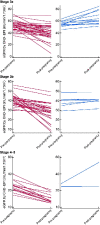The impact of chronic kidney disease Stages 3-5 on pregnancy outcomes
- PMID: 33313680
- PMCID: PMC8577624
- DOI: 10.1093/ndt/gfaa247
The impact of chronic kidney disease Stages 3-5 on pregnancy outcomes
Abstract
Background: Contemporaneous data are required for women with chronic kidney disease (CKD) Stages 3-5 to inform pre-pregnancy counselling and institute appropriate antenatal surveillance.
Methods: A retrospective cohort study in women with CKD Stages 3-5 after 20 weeks' gestation was undertaken in six UK tertiary renal centres in the UK between 2003 and 2017. Factors predicting adverse outcomes and the impact of pregnancy in accelerating the need for renal replacement therapy (RRT) were assessed.
Results: There were 178 pregnancies in 159 women, including 43 women with renal transplants. The live birth rate was 98%, but 56% of babies were born preterm (before 37 weeks' gestation). Chronic hypertension was the strongest predictor of delivery before 34 weeks' gestation. Of 121 women with known pre-pregnancy hypertension status, the incidence of delivery before 34 weeks was 32% (31/96) in women with confirmed chronic hypertension compared with 0% (0/25) in normotensive women. The risk of delivery before 34 weeks doubled in women with chronic hypertension from 20% [95% confidence interval (CI) 9-36%] to 40% (95% CI 26-56%) if the gestational fall in serum creatinine was <10% of pre-pregnancy concentrations. Women with a urinary protein:creatinine ratio >100 mg/mmol prior to pregnancy or before 20 weeks' gestation had an increased risk for birthweight below the 10th centile (odds ratio 2.57, 95% CI 1.20-5.53). There was a measurable drop in estimated glomerular filtration rate (eGFR) between pre-pregnancy and post-partum values (4.5 mL/min/1.73 m2), which was greater than the annual decline in eGFR prior to pregnancy (1.8 mL/min/1.73 m2/year). The effect of pregnancy was, therefore, equivalent to 1.7, 2.1 and 4.9 years of pre-pregnancy renal disease in CKD Stages 3a, 3b and 4-5, respectively. The pregnancy-associated decline in renal function was greater in women with chronic hypertension and in those with a gestational fall in serum creatinine of <10% of pre-pregnancy concentrations. At 1 year post-partum, 46% (58/126) of women had lost ≥25% of their pre-pregnancy eGFR or required RRT. Most women with renal transplants had CKD Stage 3 and more stable renal function prior to pregnancy. Renal transplantation was not independently associated with adverse obstetric or renal outcomes.
Conclusions: Contemporary pregnancies in women with CKD Stages 3-5 are complicated by preterm delivery, low birthweight and loss of maternal renal function. Chronic hypertension, pre- or early pregnancy proteinuria and a gestational fall in serum creatinine of <10% of pre-pregnancy values are more important predictors of adverse obstetric and renal outcome than CKD Stages 3-5. Pregnancy in women with CKD Stages 3-5 advances the need for dialysis or transplantation by 2.5 years.
Keywords: chronic renal insufficiency; hypertension; pregnancy; proteinuria.
© The Author(s) 2020. Published by Oxford University Press on behalf of ERA-EDTA.
Figures



References
Publication types
MeSH terms
Grants and funding
LinkOut - more resources
Full Text Sources
Medical
Research Materials
Miscellaneous

